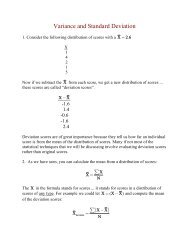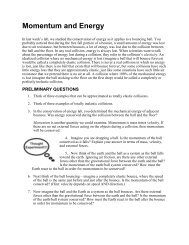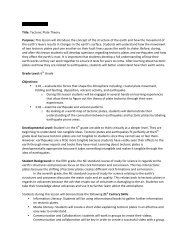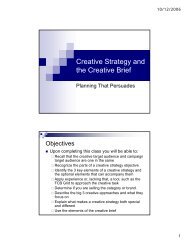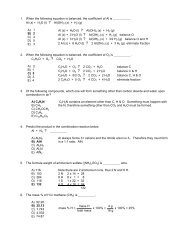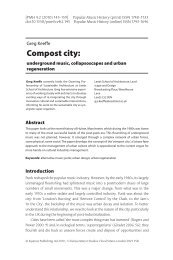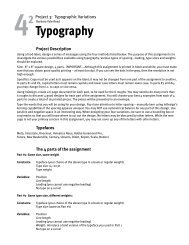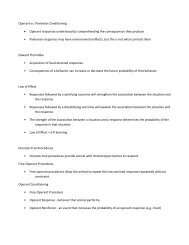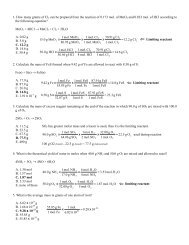Mind – Body Problem
Mind – Body Problem
Mind – Body Problem
You also want an ePaper? Increase the reach of your titles
YUMPU automatically turns print PDFs into web optimized ePapers that Google loves.
<strong>Mind</strong> <strong>–</strong> <strong>Body</strong> <strong>Problem</strong><br />
A. Recall Classical Greek attempts to understand<br />
“Reality” and knowledge … there is only one type of<br />
stuff in the world (monism) vs are two or more<br />
kinds of stuff in the world (dualism/pluralism).<br />
B. Two kinds of monists: mental monists or<br />
“idealists”” ... and physical/material monists or<br />
“materialist” .<br />
C. <strong>Mind</strong>/<strong>Body</strong> problem: For dualists…how can one<br />
kind of “thing” (e.g, mind) influence another totally<br />
different kind of “thing” (brain) . For materialists …<br />
how can “mental events” which are conscious and<br />
have intentions but do not seem to have physical<br />
features exist in a material world. [Plato and<br />
Aristotle struggle with these problems.]<br />
D. Descartes ... body functions were mechanical but there<br />
is a soul or mind that is not material.<br />
1. Solution: <strong>Mind</strong>-body interaction through the<br />
pineal gland<br />
2. Of course this idea doesn’t work but Descartes is<br />
credited with the idea that the body is like a<br />
machine<br />
3. Descartes also clearly defined the mind-body<br />
problem which allowed others to recognize and<br />
understand the problem
E. Phrenology and Development of Physiological<br />
Knowledge of the Brain/nervous system<br />
1. Bell-Magendie Law (Localization of Function)<br />
2. Johannes Muller (Specific Nerve Energies)<br />
3. Gall-Spurzheim (Phrenology)<br />
4. Faculty Psychology<br />
F. Material Monism ... three basic approaches to mindbody<br />
problem:<br />
1. Behaviorism (positivism)<br />
2. Identity Theories<br />
3. Material Functionalism<br />
G. Behaviorism: Watson/Skinner argued that the only<br />
scientifically valid approach to psych. was to study overt<br />
behavior in the context of the physical environment.<br />
With this approach there is no need to make reference to<br />
mental activity of any kind (Positivist <strong>–</strong>Comte)<br />
H. Neo-Behaviorists: Tolman/Hull etc. argued that there<br />
are “intervening variables” (Positivist <strong>–</strong> Mach)<br />
I. Identity Theories<br />
1. Strict biological reductionism (type identity)<br />
2. Weak biological reductionism (token identity)<br />
3. Emergent reductionism (system identity)<br />
I. Material functionalism is not inconsistent with some<br />
type of token reductionism but does not require a<br />
reductionist account of mental activity. According to this
theory mental events are the cause of other mental<br />
events. Causes are defined as intentions (purpose) or<br />
simple associations between ideas. Often explained using<br />
computer analogy.


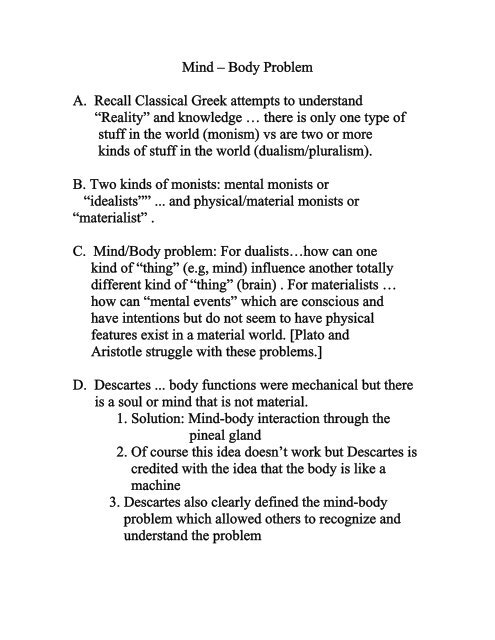

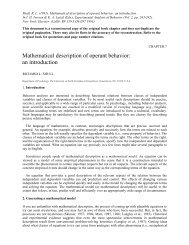
![Graduate Bulletin [PDF] - MFC home page - Appalachian State ...](https://img.yumpu.com/50706615/1/190x245/graduate-bulletin-pdf-mfc-home-page-appalachian-state-.jpg?quality=85)
